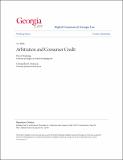|
Reseña:
|
This paper uses a newly available database of consumer credit card agreements to take the first, in-depth empirical look at why credit card issuers use arbitration clauses. Based on a sample of credit card agreements made available by 290 issuers under the Credit Card Accountability Responsibility and Disclosure Act of 2009, it finds that while most credit card loans outstanding (95.1%) are subject to cardholder agreements with arbitration clauses, the substantial majority of credit card issuers (247 of 298 or 82.9%) do not use arbitration clauses in their credit card agreements. This paper also finds that credit card issuers are more likely to use arbitration clauses when they (1) specialize in making credit card loans; (2) make riskier credit card loans; and (3) have a larger credit card portfolio. Conversely, issuers are less likely to use arbitration clauses when they are (1) mutually owned (i.e., credit unions) rather than shareholder-owned (i.e.,banks); and (2) are located in states in which class arbitration waivers are unenforceable. These empirical findings have potentially important implications for a number of timely policy questions, such as: what sorts of options are available to consumers who wish to obtain a credit card that is not subject to an arbitration clause; how increased regulation of arbitration (whether by Congress or by the Consumer Financial Protection Bureau) might affect the market for consumer credit; and how businesses are likely to respond to the Supreme Court’s recent decision in AT&T Mobiliy LLC v. Concepcion. |

